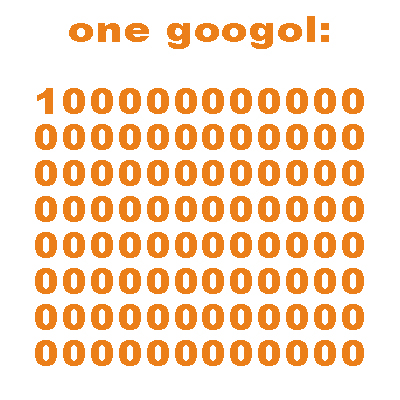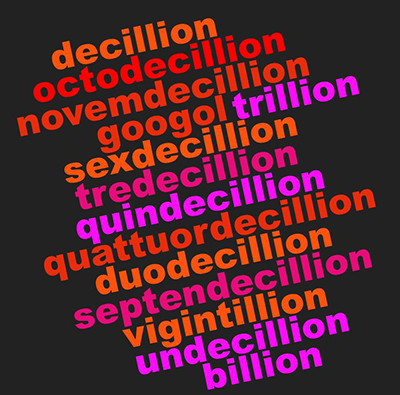 1000 billion or one trillion? It’s the same thing, but it depends who you ask. In any case they are gigantic numbers.
1000 billion or one trillion? It’s the same thing, but it depends who you ask. In any case they are gigantic numbers.
While reading an article recently in the French press where the budgets are flying through the roof again I saw the figure 1000 milliard and wondered why the journalist used that method for writing the figure, why not use trillion. In any case they are gigantic numbers. Well come to find out the French, the British (who finally agree on something with the French) and most of the rest of the world have different words than the U.S. (nothing new here, especially when it comes to measurement) for expressing these giant numbers. To try to understand the terms here is a list of them. As you will note the system for naming numbers used in the U.S. is not as logical as that used in other countries (like Great Britain, France, and Germany). In these countries, a billion – bi meaning two and -llion referring to million – logically has twice as many zeros as a million, and a trillion (tri means three right?) has three times as many zeros as a million, that’s 18, this all goes back to basic Latin and is easy to remember because it is logical. But English language usage has come to prefer the American names, leaving the logical naming to the logical Cartesians. So the French journalist said 1000 milliard (he could have said billion, but then we English speakers would have completely misunderstood), the British journalist would have written 1000 milliard, but the American would write a Trillion. All this is useful to know especially when referring to today’s budgets which are always gigantic numbers bigger than we can fathom. We do all agree however that a number with 100 zeros is a googol. Yes, the spelling of that is correct even though my spellcheck doesn’t think so. Here’s hoping it is a while yet before we read about a googol euro budget.
|
Number of zeros |
U.S. |
France/Britain |
|
3 |
thousand |
mille |
|
6 |
million |
million |
|
9 |
billion |
milliard |
|
12 |
trillion |
billion |
|
15 |
quadrillion |
1000 billion |
|
18 |
quintillion |
trillion |
|
21 |
sextillion |
1000 trillion |
|
24 |
septillion |
quadrillion |
|
27 |
octillion |
1000 quadrillion |
|
30 |
nonillion |
quintillion |
|
33 |
decillion |
1000 quintillion |
|
36 |
undecillion |
sextillion |
|
39 |
duodecillion |
1000 sextillion |
|
42 |
tredecillion |
septillion |
|
45 |
quattuordecillion |
1000 septillion |
|
48 |
quindecillion |
octillion |
|
51 |
sexdecillion |
1000 octillion |
|
54 |
septendecillion |
nonillion |
|
57 |
octodecillion |
1000 nonillion |
|
60 |
novemdecillion |
decillion |
|
63 |
vigintillion |
1000 decillion |
|
100 |
googol |
googol |
| Should you like to get a feel for these gigantic numbers count to a million one second at a time. We suggest doing this while on vacation as it will take you 12 days… | ||
If a billion American seconds is 31+ years and a billion British seconds is 31709 years how long is a New York minute?
And now to talk about computers and their gigantic numbers
Do you remember the days where we had disk space and speeds labelled in octets? An octet is 8 bits (A bit is the smallest part of computer coding, it is the zeros and ones that a computer reads, they come in packets of 8, the word bit is a contraction from Binary Digit), but a Byte is the same as an octet. Note that the symbol for bit is a small b and for Byte is a capital B. Pretty soon we had so many Bytes that we started talking about megabytes, that in turn evolved in a few years to gigabytes. Today online storage packages come in terabytes or teraoctets, and you’ll probably need only one of those for your photo collection. But data storage companies working for businesses and governments are now planning ahead and working on capacities of petabytes, exabytes and zettabytes.
1 Byte = 1 octet = 8 bits
· 1 Bit = Binary Digit
· 8 Bits = 1 Byte
· 1000 Bytes = 1 Kilobyte (ko) = 1 000 octets
· 1000 Kilobytes = 1 Megabyte (Mo) = 1 000 000 octets
· 1000 Megabytes = 1 Gigabyte (Go) = 1 000 000 000 octets
· 1000 Gigabytes = 1 Terabyte (To) = 1 000 000 000 000 octets
· 1000 Terabytes = 1 Petabyte (Po)* = 1 000 000 000 000 000 octets
· 1000 Petabytes = 1 Exabyte (Eo) = 1 000 000 000 000 000 000 octets
· 1000 Exabytes = 1 Zettabyte (Zo) = 1 000 000 000 000 000 000 000 octets
· 1000 Zettabytes = 1 Yottabyte (Yo)** = 1 000 000 000 000 000 000 000 000 octets
· 1000 Yottabytes = 1 Brontobyte = 1 000 000 000 000 000 000 000 000 000 octets
· 1000 Brontobytes*** = 1 Geopbyte = 1 000 000 000 000 000 000 000 000 000 000 octets
*“It’s hard to visualize what a Petabyte could hold. 1 Petabyte could hold approximately 20 million 4-door filing cabinets full of text. It could hold 500 billion pages of standard printed text. It would take about 500 million floppy disks to store the same amount of data.” Quote from http://www.whatsabyte.com/
** “It would take approximately 11 trillion years to download a Yottabyte file from the Internet using high-power broadband. You can compare it to the World Wide Web as the entire Internet almost takes up about a Yottabyte.” Quote from http://www.whatsabyte.com/
*** probably the size of a brontosaurus



